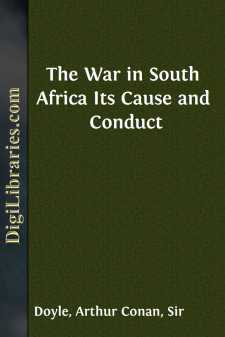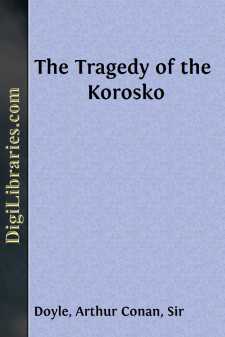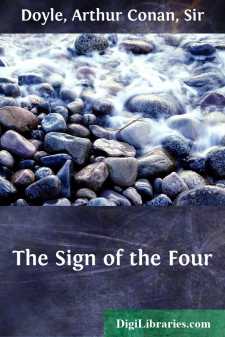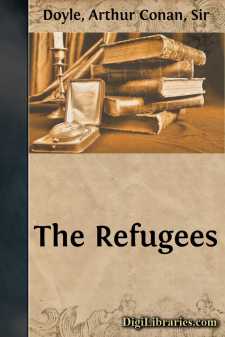Categories
- Antiques & Collectibles 13
- Architecture 36
- Art 48
- Bibles 22
- Biography & Autobiography 813
- Body, Mind & Spirit 142
- Business & Economics 28
- Children's Books 17
- Children's Fiction 14
- Computers 4
- Cooking 94
- Crafts & Hobbies 4
- Drama 346
- Education 46
- Family & Relationships 57
- Fiction 11829
- Games 19
- Gardening 17
- Health & Fitness 34
- History 1377
- House & Home 1
- Humor 147
- Juvenile Fiction 1873
- Juvenile Nonfiction 202
- Language Arts & Disciplines 88
- Law 16
- Literary Collections 686
- Literary Criticism 179
- Mathematics 13
- Medical 41
- Music 40
- Nature 179
- Non-Classifiable 1768
- Performing Arts 7
- Periodicals 1453
- Philosophy 64
- Photography 2
- Poetry 896
- Political Science 203
- Psychology 42
- Reference 154
- Religion 513
- Science 126
- Self-Help 84
- Social Science 81
- Sports & Recreation 34
- Study Aids 3
- Technology & Engineering 59
- Transportation 23
- Travel 463
- True Crime 29
Arthur Conan Doyle
Arthur Conan Doyle was a British writer best known for creating the iconic detective Sherlock Holmes, whose adventures were chronicled in a series of novels and short stories starting with "A Study in Scarlet" in 1887. Born on May 22, 1859, in Edinburgh, Scotland, Doyle was also a physician, which influenced his writing's detail and accuracy in medical matters. Beyond Holmes, he authored historical novels, science fiction, and was a fervent advocate for spiritualism later in life.
Author's Books:
Sort by:
CHAPTER I THE COAST OF FRANCE I dare say that I had already read my uncle's letter a hundred times, and I am sure that I knew it by heart. None the less I took it out of my pocket, and, sitting on the side of the lugger, I went over it again with as much attention as if it were for the first time. It was written in a prim, angular hand, such as one might expect from a man who had begun life as a...
more...
CHAPTER I. HOW THE BLACK SHEEP CAME FORTH FROM THE FOLD. The great bell of Beaulieu was ringing. Far away through the forest might be heard its musical clangor and swell. Peat-cutters on Blackdown and fishers upon the Exe heard the distant throbbing rising and falling upon the sultry summer air. It was a common sound in those parts—as common as the chatter of the jays and the booming of the bittern....
more...
It is impossible to appreciate the South African problem and the causes which have led up to the present war between the British Empire and the Boer republics without some knowledge, however superficial, of the past history of South Africa. To tell the tale one must go back to the beginning, for there has been complete continuity of history in South Africa, and every stage has depended upon that which...
more...
CHAPTER I It has been our fate, among all the innumerable generations of mankind, to face the most frightful calamity that has ever befallen the world. There is a basic fact which cannot be denied, and should not be overlooked. For a most important deduction must immediately follow from it. That deduction is that we, who have borne the pains, shall also learn the lesson which they were intended to...
more...
Chapter 1 The Warning "I am inclined to think—" said I. "I should do so," Sherlock Holmes remarked impatiently. I believe that I am one of the most long-suffering of mortals; but I'll admit that I was annoyed at the sardonic interruption. "Really, Holmes," said I severely, "you are a little trying at times." He was too much absorbed with his own thoughts to give...
more...
CHAPTER I. The public may possibly wonder why it is that they have never heard in the papers of the fate of the passengers of the Korosko. In these days of universal press agencies, responsive to the slightest stimulus, it may well seem incredible that an international incident of such importance should remain so long unchronicled. Suffice it that there were very valid reasons, both of a personal and...
more...
I. HOME. 30th March, 1881. I have missed you very much since your return to America, my dear Bertie, for you are the one man upon this earth to whom I have ever been able to unreservedly open my whole mind. I don't know why it is; for, now that I come to think of it, I have never enjoyed very much of your confidence in return. But that may be my fault. Perhaps you don't find me sympathetic,...
more...
The Science of Deduction Sherlock Holmes took his bottle from the corner of the mantel-piece and his hypodermic syringe from its neat morocco case. With his long, white, nervous fingers he adjusted the delicate needle, and rolled back his left shirt-cuff. For some little time his eyes rested thoughtfully upon the sinewy forearm and wrist all dotted and scarred with innumerable puncture-marks. Finally...
more...
THE ADVENTURE OF THE EMPTY HOUSE It was in the spring of the year 1894 that all London was interested, and the fashionable world dismayed, by the murder of the Honourable Ronald Adair under most unusual and inexplicable circumstances. The public has already learned those particulars of the crime which came out in the police investigation, but a good deal was suppressed upon that occasion, since the...
more...
CHAPTER I. THE MAN FROM AMERICA. It was the sort of window which was common in Paris about the end of the seventeenth century. It was high, mullioned, with a broad transom across the centre, and above the middle of the transom a tiny coat of arms—three caltrops gules upon a field argent—let into the diamond-paned glass. Outside there projected a stout iron rod, from which hung a gilded miniature of...
more...











